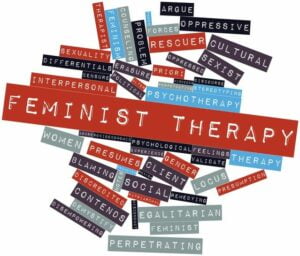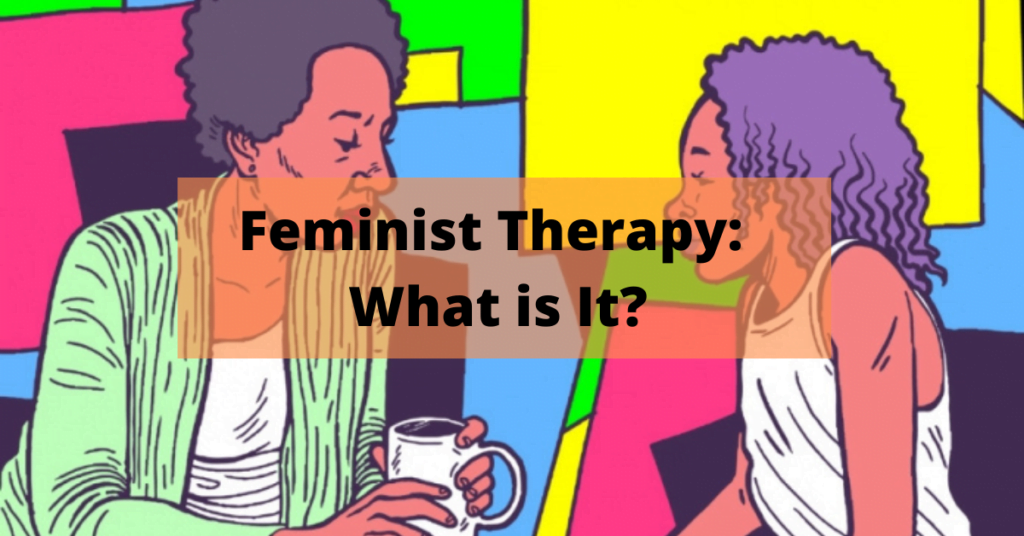Feminist therapy is a type of psychotherapy that centers on the social and political aspects of women’s lives. Feminist therapists believe that patriarchal society influences how we think about ourselves and one another. They work to change harmful societal beliefs, bring awareness to power dynamics in relationships, and help clients identify their own needs.
Contents
What Is Feminist Therapy?
 Feminist therapy is a form of therapy that is based on the idea that psychology should be gender-inclusive. This means that feminist therapists believe that they can consider both men and women. This is when it comes to psychological research, theory, and treatment.
Feminist therapy is a form of therapy that is based on the idea that psychology should be gender-inclusive. This means that feminist therapists believe that they can consider both men and women. This is when it comes to psychological research, theory, and treatment.
One of the main goals of feminist therapy is to empower women. Therapists can achieve this by helping them understand how their gender has shaped their life experiences and teaching them about the history of women’s oppression. Feminist therapists also work to challenge traditional power dynamics between men and women.
Feminist therapy is often used in conjunction with other forms of therapy, such as cognitive-behavioral therapy (CBT) or dialectical behavioral therapy (DBT). However, there are some feminists who believe that therapy should be a form of resistance and not an individualized process. In other words, feminist therapists might work to challenge the entire system that is oppressive rather than just helping individual patients.
The History of Feminist Therapy
There have been many different women throughout history who were either therapists or clients and helped to shape feminist therapy. Some of these include:
Virginia Woolf was a novelist, essayist, publisher, and writer from England during the early 1900s. She is most well known for her novel Mrs. Dalloway which focuses on an upper-class woman attempting to find meaning in life after being diagnosed with schizophrenia. In 1920 she wrote A Room Of One’s Own about how gender impacts one’s ability to succeed as a writer. Her work played a huge role in inspiring other female writers because it gave them insight into what their male counterparts went through when trying to make it as a published author
Feminist therapy can be traced back to the late 1960s, but it didn’t become popular until the 1970s. This was a time when second-wave feminism was at its peak and women were fighting for equality in all areas of life.
One of the first people who used feminist therapy as an approach to psychotherapy was Dr. Jean Baker Miller. She believed that therapists should help their patients by empowering them rather than helping them adapt to society’s expectations about gender roles. Another influential figure is Laura Brown, who advocated for using group treatment sessions instead of individual ones so that female patient could support each other during challenging times with men or family members. Other early feminists included Robin Tolmach Lakoff (author), Ann Oakley (author), and Phyllis Chesler.
Different Types of Feminist Therapy
There are many types of feminist therapy. Some of these are:
Individual Feminist Therapy
This type of therapy is designed to help individual women understand how their gender has shaped their life experiences. This type of therapy is often used in conjunction with other forms of therapy, such as cognitive-behavioral therapy (CBT) or dialectical behavioral therapy (DBT).
Group Feminist Therapy
This type of therapy is designed to help groups of women understand the impact that gender has on their lives. Group feminist therapy can be helpful for things like building self-esteem, developing social support networks, and increasing understanding of how sexism affects people’s lives.
Political Feminist Therapy
This type of therapy can help feminists work towards social change. Political feminist therapists believe that the personal is political and that change should happen on a systemic level. They often use action research methods to try and improve the conditions that oppressed groups live in.
Community-Based Feminist Therapy
This type of therapy can help communities become more aware of the ways that sexism affects their lives. It also helps them develop strategies for challenging traditional power dynamics between men and women.
Socialist Feminist Therapy
This therapy can help women resist sexism by creating alternative systems that are based on equality.
Radical Feminist Therapy
This therapy is designed to help women resist sexism by disrupting the current system of power. It can be done through education, protest, and direct action.
Marxist Feminist Therapy
This type of feminist therapy is based on the Marxist ideology that believes capitalism causes discrimination against marginalized groups such as women. This form of feminism focuses on how people are oppressed in their everyday lives because they do not have control over money or other forms of capital (such as knowledge).
Existential Feminist Therapy
This type of therapy helps clients understand the experiences that shape them psychologically so they can free themselves from social constraints imposed upon them by society’s “norms.” Existential feminists believe individuals should embrace freedom and responsibility for their own actions without having to abide by societal expectations.
Techniques of Feminist Therapy
There are many different techniques that feminist therapists use in order to help their clients.
Empowerment Techniques
These types of techniques encourage people to take control over their lives and make the best out of any situation they are experiencing. They often involve activities where clients can express themselves through writing or art that represent some aspect that means something important for them.
Diversity and Difference Techniques
This type of technology helps clients acknowledge differences between different genders, ethnicities, socioeconomic statuses, abilities/disabilities, etc., while at the same time promoting diversity within these groups. It also encourages individuals from each group to learn more about other groups so they gain a better understanding of what it’s like to be part of those communities as well.
Power Analysis
This technique helps people understand how they can resist dominant norms. Therapists may assign readings or give lectures about power and the way it is used to oppress certain groups of women (i.e., racial minorities, LGBTQ+, etc.). By doing this clients can become more aware of their privilege as well as become an ally for other marginalized populations.
Resistance Techniques
These techniques encourage people who have less social power than others (such as white women) to develop strategies that help them reject harmful stereotypes against them like ‘white women are overly emotional.’ They also allow these same individuals to identify when someone might try to silence their concerns because of a lack of understanding surrounding what being a member of this group means. Lastly, resistance techniques help people learn how to safely confront those in positions of power who are perpetuating systems of inequality.
Feminist Therapy Approaches
There are many different feminist therapy approaches, but some of the most common ones include:
Cognitive-Behavioral Therapy (CBT)
CBT is a type of therapy that helps people change the way they think about themselves and their environment. It focuses on how our thoughts can affect our feelings and behavior.
Dialectical Behavioral Therapy (DBT)
DBT is a type of therapy that helps people learn to control their emotions and behaviors. It also teaches coping skills for dealing with stressful situations.
Mindfulness-Based Cognitive Therapy (MBCT)
MBCT combines cognitive behavioral therapy with mindfulness techniques in order to help individuals regulate their thoughts, feelings, and behaviors while increasing self-awareness.
Some critics argue that feminist therapists should not work individually or focus on the individual needs of women because this leaves other women behind who might need additional assistance from mental health professionals. They suggest that group settings are more helpful when it comes to practicing feminism within psychotherapy. However, others disagree saying that feminist therapists must be able to incorporate all theories about gender development into treatment plans whether they work with one woman or a group of women.
Benefits of Feminist Therapy
These are some of the benefits that have been reported by people who have undergone feminist therapy:
Improves Self-Esteem
It improves self-esteem because it helps people to understand how society has shaped their thoughts and feelings about themselves. This means they are less likely to blame themselves for their problems and can start to see themselves in a more positive light.
Helps People Deal with Trauma
Feminist therapy can help people deal with the trauma they have experienced by giving them a safe space to talk about their experiences without feeling judged. It also helps them understand how the trauma has affected them and provides tools for managing difficult emotions.
Leads to Greater Social Justice Activism
Some people who undergo feminist therapy become social justice activists because they want to create change on a systemic level. They often feel motivated to do this after realizing the ways that sexism has impacted their lives personally.
Creates Support Networks
Feminist therapy often creates support networks of women who can offer each other practical and emotional support. These networks are often very valuable for women who have experienced abuse or trauma. It can be helpful to have a group of people who understand what you’re going through and can offer support.
Teaches Coping Skills
This type of therapy can help people learn coping skills for dealing with difficult situations and emotions. They may also receive training in stress management techniques regardless of whether or not they work on trauma.
Promotes Equality
This promotes equality because it helps people understand how social norms affect their lives personally. They learn to resist these norms and advocate for equality of the sexes in all aspects of life.
Conclusion
The idea of feminist therapy is based on the principle of treating a woman as an individual and not just one member of her gender. In this way, it strives to create more equitable relationships between men and women in our society by providing therapists with tools that will help them better understand how their female clients think about themselves and what they want from life. This can be a powerful tool for those who suffer from depression or anxiety because it addresses the issue at its root level-the core beliefs each person holds about themselves. Feminist therapists can look beyond traditional therapeutic models (and oftentimes even medical ones) to find what may be causing your symptoms because there’s no “one size fits all” approach when dealing with mental health issues.
If you are looking for affordable Online Counseling MantraCare can help: Book a trial therapy session


